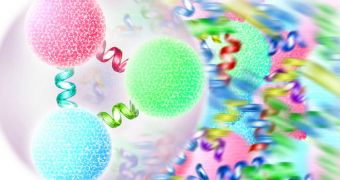In the first few billionths of a second after the Big Bang occurred, the Universe expanded many times over its original volume. All matter existed exclusively in the form of a mixture of elementary particles, called a quark-gluon soup. At this point, our particle accelerators can produce it at will.
Scientists say that working with this amazing state of matter represents an opportunity to understand the conditions that permeated the Cosmos immediately after it formed. Learning more about the quark-gluon soup could reveal why the laws of the Universe are set up the way they are, Space reports.
Thus far, the CERN Large Hadron Collider (LHC), in Switzerland, and the Relativistic Heavy Ion Collider (RHIC), in the US, have managed to produce the extremely hot mixture, which reaches a whopping 7 to 10 trillion degrees Fahrenheit (4 to 6 trillion degrees Celsius).
Though scientists don't yet have the tools to investigate this amazing substance, they hope that, in the near future, technological and scientific advancements will enable them to unlock the mysteries of the Universe.

 14 DAY TRIAL //
14 DAY TRIAL //